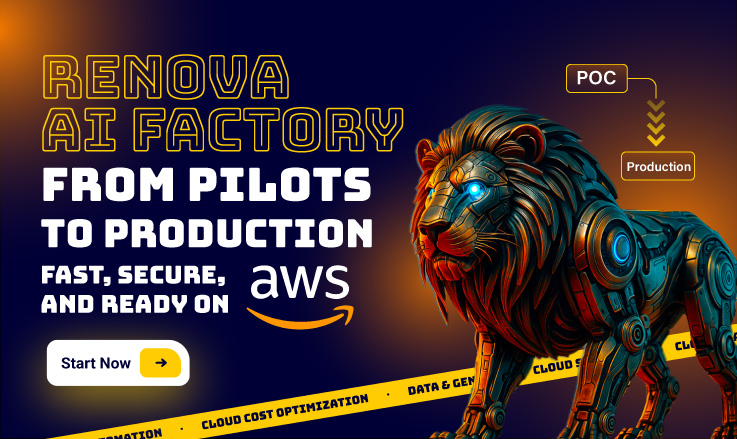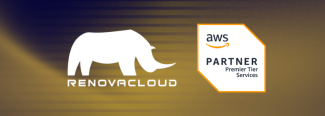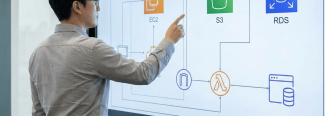
AWS Certified Cloud Practitioner vs AWS Certified Solutions Architect
Table of Contents
Deciding where to start with Amazon Web Services (AWS) certifications can feel like a major challenge. You see two popular options pop up everywhere: the AWS Certified Cloud Practitioner and the AWS Certified Solutions Architect – Associate. They both sound important, but they serve very different purposes. This guide will help you understand the difference between them so you can choose the right starting point for your career.
What is the AWS Certified Cloud Practitioner (CLF-C02)
The AWS Certified Cloud Practitioner, or CCP, is the foundational certification for AWS. Think of it as the 101-level course for the entire AWS ecosystem.
Its main goal is to give you a broad, high-level understanding of the AWS cloud. It answers the “what” and “why” questions. What is cloud computing? Why do businesses use it? What are the main services AWS offers? What are the benefits of the AWS cloud?
This certification is not deeply technical. It focuses on the core concepts, the value proposition of AWS, basic security, and the billing and pricing models. You will learn the names of many services, like EC2 for compute or S3 for storage, and you’ll understand what they do in a general sense. You won’t be expected to build complex systems with them.
Who Should Get This Certification
The Cloud Practitioner is designed for a wide audience, including people who are not in traditional, hands-on technical roles. You should strongly consider this certification if you are:
- An absolute beginner to cloud computing and want a structured place to start.
- In a non-technical role such as sales, marketing, finance, or project management, and you need to communicate effectively with technical teams or customers about AWS.
- A manager or executive who needs to understand the business benefits and financial impact of moving to the cloud.
- An IT professional who has been working in a different area (like networking or databases) and wants a gentle introduction to cloud concepts before diving into deeper technical training.
What the Cloud Practitioner Exam Covers
The exam, code-named CLF-C02, is broken down into four main areas or domains:
- Cloud Concepts (24%): This section tests your understanding of what the AWS cloud is, its advantages (like elasticity and scalability), and its basic architectural principles.
- Security and Compliance (30%): This is a large part of the exam. It covers the AWS shared responsibility model (what AWS secures vs. what you must secure), basic AWS security services, and compliance.
- Cloud Technology and Services (34%): This domain covers the core AWS services. You’ll need to identify services for compute, storage, networking, and databases (like EC2, S3, VPC, and RDS).
- Billing, Pricing, and Support (12%): This area focuses on how AWS pricing works. You’ll need to understand the different pricing models (like On-Demand vs. Reserved Instances) and the available support plans.
Exam Quick Facts
- Exam Code: CLF-C02
- Format: 65 multiple-choice and multiple-response questions
- Time: 90 minutes
- Cost: Approximately $100 USD
- Prerequisites: None. AWS recommends about six months of general exposure to AWS, but this is not a requirement.
What is the AWS Certified Solutions Architect – Associate (SAA-C03)
If the Cloud Practitioner is the 101 course, the AWS Certified Solutions Architect – Associate (SAA) is the 300-level technical lab. This is one of the most recognized and sought-after certifications in the entire IT industry.
This certification is deeply technical. It moves far beyond “what” a service is and focuses entirely on “how” and “why” you use multiple services together to build complex, real-world solutions.
The core of this certification is learning to design and deploy systems that are secure, resilient, high-performing, and cost-optimized on AWS. This means you’ll be given real-world business problems (scenarios) and you must choose the right combination of AWS services to solve them. You’ll learn how to make an application automatically scale to handle traffic, how to make it survive a data center failure, and how to keep it secure from threats, all while managing costs.
Who Should Get This Certification
This certification is aimed squarely at people in hands-on technical roles or those who want to be. You should aim for this certification if you are:
- A developer, sysadmin, or engineer who will be responsible for building, deploying, or managing applications on AWS.
- An IT professional who already has a good understanding of networking, virtualization, or application development and wants to specialize in cloud architecture.
- A solutions architect or someone aspiring to that role, whose job is to design the “blueprints” for cloud systems.
- Anyone in a technical role who wants to prove they have the practical skills to work with AWS, not just a theoretical understanding.
What the Solutions Architect Exam Covers
The exam, code-named SAA-C03, is also broken into four domains, but they are much more complex and technical than the Practitioner’s:
- Design Secure Architectures (30%): This covers implementing secure access to your AWS resources (using IAM), protecting your network (with VPCs, security groups), and encrypting your data.
- Design Resilient Architectures (26%): This domain is about building systems that don’t fail. You’ll learn how to use multiple Availability Zones, design for fault tolerance, and set up disaster recovery.
- Design High-Performing Architectures (24%): This focuses on speed and efficiency. It involves choosing the right compute (EC2), storage (S3, EBS), and database (RDS, DynamoDB) solutions for specific workloads.
- Design Cost-Optimized Architectures (20%): This tests your ability to build solutions that meet all the technical requirements without wasting money. This means selecting the right pricing models and services to be cost-effective.
Exam Quick Facts
- Exam Code: SAA-C03
- Format: 65 multiple-choice and multiple-response questions (many are long, scenario-based)
- Time: 130 minutes
- Cost: Approximately $150 USD
- Prerequisites: None formally. However, AWS strongly recommends at least one year of hands-on experience building solutions on AWS.
Comparison Between Cloud Practitioner vs Solutions Architect
Here is a direct comparison of the two certifications.
| Feature | AWS Certified Cloud Practitioner (CCP) | AWS Certified Solutions Architect – Associate (SAA) |
| Level | Foundational | Associate |
| Focus | What AWS is (the concepts, services, and value) | How to build with AWS (the design and architecture) |
| Audience | Non-technical roles (sales, finance, management) and new-to-cloud technical staff | Technical roles (engineers, developers, architects) |
| Difficulty | Entry-level. Can be passed with a few weeks of study. | Intermediate. Requires significant study and ideally hands-on experience. |
| Prerequisites | None. | None are required, but AWS recommends the CCP or equivalent experience first. |
| Career Impact | A great entry point. Shows you are cloud-literate. | A powerful career builder. Directly qualifies you for technical cloud roles. |
A New Contender The AWS Certified AI Practitioner
Recently, AWS introduced a new foundational certification that is rapidly gaining attention: the AWS Certified AI Practitioner. This exam (officially coded AIF-C01) was released in 2024 and targets the massive interest in artificial intelligence and machine learning.
Like the Cloud Practitioner, this is a foundational-level certification. It is not designed for data scientists or ML engineers who build deep learning models. Instead, it is for individuals who need to understand the concepts and business value of AI and ML on the AWS platform.
This certification is proving popular for both non-technical and technical professionals. Product managers, business leaders, and sales teams are taking it to understand what AI can do for their business. At the same time, developers and architects are using it as a starting point before moving on to the more advanced AWS Certified Machine Learning – Specialty certification.
AWS Cloud Practitioner vs AWS AI Practitioner
Since both are foundational certifications, how do they compare?
The simplest way to think about it is breadth versus depth.
The AWS Certified Cloud Practitioner is broad. It covers the entire AWS ecosystem at a shallow level. You learn a little bit about compute, storage, databases, networking, security, and billing. Its goal is to make you “cloud-literate.”
The AWS Certified AI Practitioner is deep but narrow. It focuses almost entirely on one specific domain: artificial intelligence and machine learning. You will not learn about general networking or billing. Instead, you will learn:
- Core AI/ML Concepts: What is machine learning? What is deep learning? What is generative AI?
- The ML Lifecycle: You will learn the steps of a typical machine learning project, from problem framing and data collection to model training and deployment.
- Core AWS AI/ML Services: You will learn what services like Amazon SageMaker (for building models), Amazon Bedrock (for using foundation models), and higher-level AI services (like Amazon Transcribe for speech-to-text) are used for.
- Responsible AI: A significant part of the exam covers the principles of responsible and ethical AI, including fairness, explainability, and security.
For many people, the Cloud Practitioner is still the right first step. However, if your role or company is exclusively focused on AI initiatives, the AI Practitioner is an excellent alternative or a great second certification to get.
Which Certification Path Should You Choose?
Here are a few common scenarios to help you decide on the right path for your career.
For the Cloud Newcomer or Non-Technical Professional
If you work in management, sales, finance, project management, or any other role that touches the cloud, start with the AWS Certified Cloud Practitioner. It will give you the complete vocabulary you need to have intelligent conversations with technical teams and understand the business impact of AWS.
For the Aspiring Cloud Engineer or Architect
If your goal is a hands-on technical job, you have two great options.
- The Standard Path: Start with the AWS Certified Cloud Practitioner to learn the fundamentals. Then, immediately move on to the AWS Certified Solutions Architect – Associate. The CCP builds your confidence and provides a solid base, making the SAA less intimidating.
- The Direct Path: If you already have a good IT background (perhaps as a developer or systems administrator) and are comfortable learning technical concepts, you can skip the CCP and go directly to the AWS Certified Solutions Architect – Associate.
For the AI and Data-Focused Professional
If your career is focused on data, analytics, or the new wave of generative AI, your path might look different.
Start with the AWS Certified Cloud Practitioner to get the general cloud knowledge. Then, take the AWS Certified AI Practitioner to build your specialized knowledge in that domain. This combination shows you understand both the general AWS platform and the specific AI/ML services that run on it.
This is a powerful combination for product managers, data analysts, and business leaders in AI-driven companies.
Your Path Forward
Ultimately, the choice between the AWS Certified Cloud Practitioner and the AWS Certified Solutions Architect – Associate is a choice between breadth and depth.
- Choose the Cloud Practitioner if you need a broad overview of the cloud, are in a non-technical role, or are an absolute beginner starting your IT journey.
- Choose the Solutions Architect – Associate if you have a technical background and your goal is to design, build, and manage applications and infrastructure on AWS.
There is no wrong choice. The best certification is the one that matches your current skills and your future ambitions. However, it’s also important to note that certifications remain valid for 3 years and then recertification is required (either by passing the current version of the exam or by earning a higher-level AWS certification).
Whichever path you choose, starting your AWS certification journey is a powerful step toward advancing your career in the cloud.
Contact Renova Cloud today for a free demo. We’ll show you exactly how we can help you achieve your business goals with the power of AWS.



